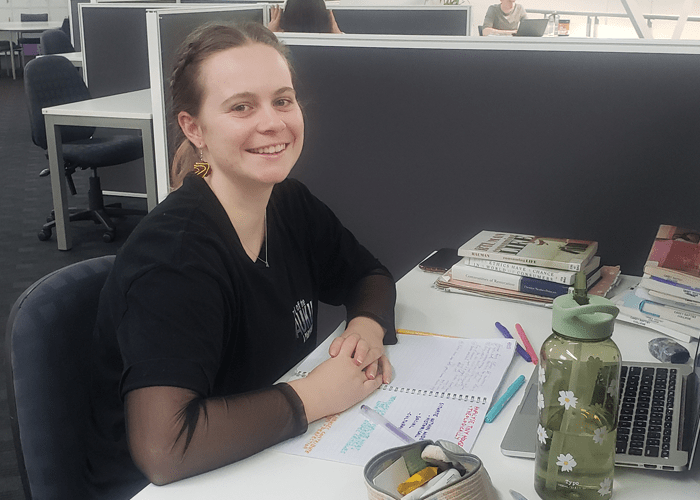An Interview with Rebecca Hooper
We recently asked Bachelor of Applied Theology student and Student Association Vice-President Rebecca Hooper to share her insights into studying at Carey.
Rebecca, can you tell us a bit about yourself? What were you doing before Carey? Why did you choose to start learning with us?
I am currently a second-year student at Carey, studying full-time onsite and absolutely loving it. Outside of studying, I work at a roller skating rink and enjoy creative outlets such as art journaling! I moved up to Carey from my hometown, Wellington, at the beginning of 2020. Having left a university course that wasn’t right for me, taking some time off for my holistic wellbeing and then working for 18 months, at the end of 2019 I felt like God affirmed my readiness to move to Auckland and wholeheartedly commit myself to theological study. I was drawn to Carey because that was where three of my pastors – whom I deeply love and respect – had studied. Furthermore, in looking at all the courses that were offered, I felt excited about how many great classes there were to choose from. There are more papers I want to do than the amount that make up a Bachelor’s degree!
Last semester you took a course on the Holy Spirit and the Trinity (and did very well, I understand!). What key discoveries did you make during that course? And how have they begun to transform your approach to discipleship, leadership, and the church?
Spirit and Trinity was so fantastic- it was a workout and a half for my brain, which made the moments when theological concepts and understandings did settle into place all the more satisfying! The complexity of the Trinity, and the way we spent an entire semester simply trying to put words to God’s being, made me hugely thankful for the gracious way God enables us to know Godself through self-revelation. One of our textbooks tackled the Trinity by means of mutually dependent systematic theology and biblical exegesis, a pair that tends to stand separately from one another. Seeing the careful way this aligning of theology and exegesis was executed has given me tools for my own future study, regardless of the topic. I have noticed that I am better equipped to approach Scripture, literature and general discussion critically. For example, I notice myself drawing connections between my current class on Romans and what I now know about trinitarian discourse, and thinking about the nuances (accurate or otherwise) of how people around me talk about God. I love that I have a better vocabulary and understanding as a foundation for all things to do with my faith.
You’re currently studying a course called “The People of God.” That’s all about the theology and practice of church, right? How has this course begun to change the way you view the church? Are there any practical implications for the way we “do” church in Aotearoa today?
That’s right – and to an extent, we are questioning whether the present “church” really is doing justice to “church” as God called us to be. We are navigating the gap between the two, a gap that is a direct result of our world that has been broken by sin. Because ecclesiology is a “derivative doctrine,” the church is not simply to be studied as a community of humans, but rather must be recognised as a direct result of God’s loving character and abundant grace. Therefore, it is never going to be well understood if it is purely analysed in terms of structure, events planning and polity, thus disregarding the role of Christ as head of the body. Honestly, the more I learn, the more questions I have, but it is comforting to know that my classmates are grappling with the same questions, with a genuine desire to positively impact the people of Aotearoa. In the end, it’s about faithfully seeking God’s transformation not through our own strength but by the work of the Holy Spirit in us. How exciting is that?!
As you know, at Carey we have a strong emphasis on the formation of the whole person. How have your studies served to equip you not just with new knowledge, but also with new skills and a new character?
I am constantly reminding myself that the hours I put into study is about so much more than a qualification, it’s about my entire life. I honestly think that no time spent learning about God is ever wasted! Carey isn’t just about forming faithful pastors, it’s about forming faithful Christians. Knowing that Scripture is the living Word of God fuels my desire to draw closer to God in all parts of my life, and what I learn flows directly into the way I go about my daily life. At the beginning of Spirit and Trinity, we were asked if we had any trepidations as we headed into the course. For me, I was afraid that I wouldn’t experience transformation. In retrospect, I think transformation isn’t necessarily about striving for something to happen, but rather being open and willing, echoing Samuel by saying, “Speak; your servant is listening.” I feel fully supported by the incredible staff of Carey who see me and know me as I walk this journey of discovery and personal development.
You’re co-president of the Carey Student Association (SASS). What does SASS do?
SASS is an opportunity for students to support students. As well as being present at Carey Board meetings, our heart is for cultivating a thriving sense of community. We helped organise a fun day in Semester One, keep the communal barista coffee machine full of beans and most recently arranged a “Merry Carey Midwinter Christmas,” which included a roast lunch, a pavlova dessert, a carol-singing ukulele ensemble (featuring an original verse about our very own John Tucker), a Christmas quiz and an opportunity to wear onesies to class. I couldn’t stop smiling all day, and I really hope that all involved were able to just have fun and know that we value each one of them. We also are given space to bring to the table initiatives that are important to us – we have implemented a system where Keep cups and Tupperware are available to take to the nearby cafe and sushi store, in order to reduce our environmental impact.
In recent years Carey has developed into a truly national college, with close to half our students based in towns and cities right across Aotearoa. How is SASS/Carey supporting those off-campus students?
As part of our team, we have a distance representative who helps us figure out how we can include those unable to come to campus and strengthen their sense of belonging. One of the positive outcomes of the COVID situation was the rapid implementation of technology that enables distance students to join in on lectures live, via Zoom. It is so nice to see the distance whanau on screen (affectionately dubbed “zoomies”), and the lecturers work hard to ensure that they feel comfortable to ask questions and contribute to conversation as if they were sitting in the room. Furthermore, last semester we rallied the onsite students and sent out 97 cards with personal messages and encouragements to our distance students. No matter whether it is family needs, work commitments or physical distance that prevents them from studying onsite, we hope that they feel valued and seen.
What would you say to those ministry leaders and volunteers in our churches who want to grow in their capacity to serve and make a difference, but who feel they can’t or don’t want to drop their ministry in order to study? Are there any good options for studying alongside their ministry?
The beauty of Carey is its flexibility! I have many friends who are doing both ministry and study. I know that I am genuinely valued, not as a student ID number on a screen, but as an entire person. Due to this, I am confident that something manageable could be figured out for leaders, volunteers and pew-warmers alike! Whether that be a Certificate/Diploma of Christian Studies, or even a Bachelor’s degree chipped away at one paper at a time, once you join the Carey community you won’t want to leave.
What would you say to the person who is wondering if study at Carey is only for academic people who loved school?
Carey is only for academic people as much as church is only for academic people (that is, not at all!!!). I would say to still your heart, and ask God where it is that you are being called to. If it feels like you’re being thrown in the deep end, recall Mark 4:35-41. We serve the Jesus whom even the strongest winds and fiercest waves obey.
Finally, what do you love most about Carey?
I love that I am learning about a God who loves me unconditionally, whose love will not waver no matter whether I understand what an abductive socio-poiesitic church is or not. I love that together, we are learning, and growing, and being challenged, and worshipping, and getting things wrong, and having fun, and trying to love others better.


0 Comments